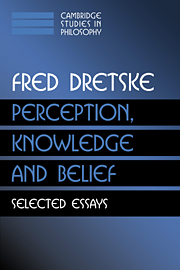10 - What Good Is Consciousness?
Published online by Cambridge University Press: 19 December 2009
Summary
If consciousness is good for something, conscious things must differ in some causally relevant way from unconscious things. If they do not, then, as Davies and Humphreys conclude, too bad for consciousness: “psychological theory need not be concerned with this topic.”
Davies and Humphreys are applying a respectable metaphysical idea – the idea, namely, that if an object's having a property does not make a difference to what that object does, if the object's causal powers are in no way enhanced (or diminished) by its possession of this property, then nothing the object does can be explained by its having that property. A science dedicated to explaining the behavior of such objects would not have to concern itself with that property. That is why being an uncle is of no concern to the psychology (let alone the physics) of uncles. I am an uncle, yes, but my being so does not (causally speaking) enable (or prevent) me to do anything I would not otherwise be able to do. The fact that I am an uncle (to be distinguished, of course, from my believing I am an uncle) does not explain anything I do. From the point of view of understanding human behavior, then, the fact that some humans are uncles is epiphenomenal. If consciousness is like that – if it is like being an uncle – then, for the same reason, psychological theory need not be concerned with it.
- Type
- Chapter
- Information
- Perception, Knowledge and BeliefSelected Essays, pp. 178 - 192Publisher: Cambridge University PressPrint publication year: 2000



